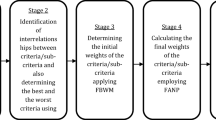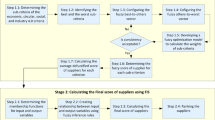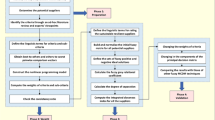Abstract
Partner selection is a crucial problem in supply chain management in which it is essential today to integrate sustainability criteria due to regulation, stakeholder pressers and economic interests. Thus, a sustainability-focused evaluation model for partner selection is required in order to improve the overall performance of the supply chain. This paper develops a new hybrid approach to evaluate and select the partners (suppliers and 3PRL providers) in sustainable supply chain network by combining Fuzzy Analytic Hierarchy Process (F-AHP) with Fuzzy Preference Ranking Organization Method for Enrichment Evaluation (F-PROMETHEE), and Fuzzy Technique for Order Performance by Similarity to Ideal Solution (F-TOPSIS). A set of sustainability criteria for both supplier and 3PRL provider selection is proposed based on extensive literature review and experts’ opinions. F-AHP is used to calculate the priority weight of each criterion. Then, F-PROMETHEE and F-TOPSIS are both used to rank the partners comparatively. The validity and efficacy of the proposed approach is demonstrated through an application for selecting partners in the case of light bulbs recycling which has been strengthened by sensitivity analysis.



Similar content being viewed by others
References
Zandieh, M., Chensebli, A.: Reverse logistics network design: a water flow-like algorithm approach. OPSEARCH 53, 667–692 (2016). https://doi.org/10.1007/s12597-016-0250-0
Kannan, G., Pokharel, S., Sasi Kumar, P.: A hybrid approach using ISM and fuzzy TOPSIS for the selection of reverse logistics provider. Resour. Conserv. Recycl. 54, 28–36 (2009). https://doi.org/10.1016/j.resconrec.2009.06.004
Senthil, S., Srirangacharyulu, B., Ramesh, A.: A decision making methodology for the selection of reverse logistics operating channels. Procedia Eng. 38, 418–428 (2012). https://doi.org/10.1016/j.proeng.2012.06.052
Meade, L., Sarkis, J.: A conceptual model for selecting and evaluating third-party reverse logistics providers. Supply Chain Manag. Int. J. 7, 283–295 (2002). https://doi.org/10.1108/13598540210447728
Zhao, K., Yu, X.: A case based reasoning approach on supplier selection in petroleum enterprises. Expert Syst. Appl. 38, 6839–6847 (2011). https://doi.org/10.1016/j.eswa.2010.12.055
Govindan, K., Khodaverdi, R., Jafarian, A.: A fuzzy multi criteria approach for measuring sustainability performance of a supplier based on triple bottom line approach. J. Clean. Prod. 47, 345–354 (2013). https://doi.org/10.1016/j.jclepro.2012.04.014
Lee, A.H.I., Kang, H.-Y., Hsu, C.-F., Hung, H.-C.: A green supplier selection model for high-tech industry. Expert Syst. Appl. 36, 7917–7927 (2009). https://doi.org/10.1016/j.eswa.2008.11.052
Chatterjee, K., Kar, S.: Multi-criteria analysis of supply chain risk management using interval valued fuzzy TOPSIS. OPSEARCH 53, 474–499 (2016). https://doi.org/10.1007/s12597-015-0241-6
Sharma, M.J., Yu, S.J.: Selecting critical suppliers for supplier development to improve supply management. OPSEARCH 50, 42–59 (2013). https://doi.org/10.1007/s12597-012-0097-y
Hervani, A.A., Helms, M.M., Sarkis, J.: Performance measurement for green supply chain management. Benchmarking Int. J. 12, 330–353 (2005). https://doi.org/10.1108/14635770510609015
Mathiyazhagan, K., Datta, U., Bhadauria, R., Singla, A., Krishnamoorthi, S.: Identification and prioritization of motivational factors for the green supply chain management adoption: case from Indian construction industries. OPSEARCH (2017). https://doi.org/10.1007/s12597-017-0316-7
Nikolaou, I.E., Evangelinos, K.I., Allan, S.: A reverse logistics social responsibility evaluation framework based on the triple bottom line approach. J. Clean. Prod. 56, 173–184 (2013). https://doi.org/10.1016/j.jclepro.2011.12.009
Kafa, N., Hani, Y., Mhamedi, A.E.: An integrated sustainable partner selection approach with closed-loop supply chain network configuration. IFAC-Pap. 48, 1840–1845 (2015). https://doi.org/10.1016/j.ifacol.2015.06.354
Tuzkaya, G., Ozgen, A., Ozgen, D., Tuzkaya, U.R.: Environmental performance evaluation of suppliers: a hybrid fuzzy multi-criteria decision approach. Int. J. Environ. Sci. Technol. 6, 477–490 (2009). https://doi.org/10.1007/BF03326087
Mathiyazhagan, K., Sudhakar, S., Bhalotia, A.: Modeling the criteria for selection of suppliers towards green aspect: a case in Indian automobile industry. OPSEARCH (2017). https://doi.org/10.1007/s12597-017-0315-8
Chan, F.T.S., Kumar, N.: Global supplier development considering risk factors using fuzzy extended AHP-based approach. Omega 35, 417–431 (2007). https://doi.org/10.1016/j.omega.2005.08.004
Zouggari, A., Benyoucef, L.: Simulation based fuzzy TOPSIS approach for group multi-criteria supplier selection problem. Eng. Appl. Artif. Intell. 25, 507–519 (2012). https://doi.org/10.1016/j.engappai.2011.10.012
Shaw, K., Shankar, R., Yadav, S.S., Thakur, L.S.: Supplier selection using fuzzy AHP and fuzzy multi-objective linear programming for developing low carbon supply chain. Expert Syst. Appl. 39, 8182–8192 (2012). https://doi.org/10.1016/j.eswa.2012.01.149
Luthra, S., Govindan, K., Kannan, D., Mangla, S.K., Garg, C.P.: An integrated framework for sustainable supplier selection and evaluation in supply chains. J. Clean. Prod. 140, 1686–1698 (2017). https://doi.org/10.1016/j.jclepro.2016.09.078
Kafa, N., Hani, Y., El Mhamedi, A.: Sustainable approach for third-party reverse logistics provider selection. Presented at the GSC’2014 International Conference on Green Supply Chain, Arras, France, 25 June 2014
Senthil, S., Srirangacharyulu, B., Ramesh, A.: A robust hybrid multi-criteria decision making methodology for contractor evaluation and selection in third-party reverse logistics. Expert Syst. Appl. 41, 50–58 (2014). https://doi.org/10.1016/j.eswa.2013.07.010
Kannan, G., Murugesan, P.: Selection of third-party reverse logistics provider using fuzzy extent analysis. Benchmarking Int. J. 18, 149–167 (2011). https://doi.org/10.1108/14635771111109869
Sasikumar, P., Haq, A.N.: Integration of closed loop distribution supply chain network and 3PRLP selection for the case of battery recycling. Int. J. Prod. Res. 49, 3363–3385 (2011). https://doi.org/10.1080/00207541003794876
Kannan, G.: Fuzzy approach for the selection of third party reverse logistics provider. Asia Pac. J. Mark. Logist. 21, 397–416 (2009). https://doi.org/10.1108/13555850910973865
Cheng, Y.-H., Lee, F.: Outsourcing reverse logistics of high-tech manufacturing firms by using a systematic decision-making approach: TFT-LCD sector in Taiwan. Ind. Mark. Manag. 39, 1111–1119 (2010). https://doi.org/10.1016/j.indmarman.2009.10.004
Wang, J., Zhu, Y.: Research on third-party reverse logistics provider selection based on fuzzy clustering in perspective of low-carbon economy. Commun. Inf. Sci. Manag. Eng. 2, 63–66 (2011)
Zareinejad, M., Javanmard, H., Arak, I.: Evaluation and selection of a third-party reverse logistics provider using ANP and IFG-MCDM methodology. Life Sci. J. 10, 350–355 (2013)
Datta, S., Samantra, C., Sankar Mahapatra, S., Mandal, G., Majumdar, G.: Appraisement and selection of third party logistics service providers in fuzzy environment. Benchmarking Int. J. 20, 537–548 (2013). https://doi.org/10.1108/BIJ-11-2011-0087
Tajik, G., Azadnia, A.H., Ma’aram, A.B., Hassan, S.A.H.S.: A hybrid fuzzy MCDM approach for sustainable third-party reverse logistics provider selection. Adv. Mater. Res. 845, 521–526 (2013). https://doi.org/10.4028/www.scientific.net/AMR.845.521
Ravi, V., Shankar, R., Tiwari, M.K.: Analyzing alternatives in reverse logistics for end-of-life computers: ANP and balanced scorecard approach. Comput. Ind. Eng. 48, 327–356 (2005). https://doi.org/10.1016/j.cie.2005.01.017
Efendigil, T., Önüt, S., Kongar, E.: A holistic approach for selecting a third-party reverse logistics provider in the presence of vagueness. Comput. Ind. Eng. 54, 269–287 (2008). https://doi.org/10.1016/j.cie.2007.07.009
Liu, C.-L., Lyons, A.C.: An analysis of third-party logistics performance and service provision. Transp. Res. Part E Logist. Transp. Rev. 47, 547–570 (2011). https://doi.org/10.1016/j.tre.2010.11.012
Govindan, K., Palaniappan, M., Zhu, Q., Kannan, D.: Analysis of third party reverse logistics provider using interpretive structural modeling. Int. J. Prod. Econ. 140, 204–211 (2012). https://doi.org/10.1016/j.ijpe.2012.01.043
Bai, C., Sarkis, J.: Flexibility in reverse logistics: a framework and evaluation approach. J. Clean. Prod. 47, 306–318 (2013). https://doi.org/10.1016/j.jclepro.2013.01.005
Ha, S.H., Krishnan, R.: A hybrid approach to supplier selection for the maintenance of a competitive supply chain. Expert Syst. Appl. 34, 1303–1311 (2008). https://doi.org/10.1016/j.eswa.2006.12.008
Ho, W., Xu, X., Dey, P.K.: Multi-criteria decision making approaches for supplier evaluation and selection: a literature review. Eur. J. Oper. Res. 202, 16–24 (2010). https://doi.org/10.1016/j.ejor.2009.05.009
Chan, F.T.S., Chan, H.K.: An AHP model for selection of suppliers in the fast changing fashion market. Int. J. Adv. Manuf. Technol. 51, 1195–1207 (2010). https://doi.org/10.1007/s00170-010-2683-6
Yeh, W.-C., Chuang, M.-C.: Using multi-objective genetic algorithm for partner selection in green supply chain problems. Expert Syst. Appl. 38, 4244–4253 (2011). https://doi.org/10.1016/j.eswa.2010.09.091
Amin, S.H., Zhang, G.: An integrated model for closed-loop supply chain configuration and supplier selection: multi-objective approach. Expert Syst. Appl. 39, 6782–6791 (2012). https://doi.org/10.1016/j.eswa.2011.12.056
Kannan, D., Khodaverdi, R., Olfat, L., Jafarian, A., Diabat, A.: Integrated fuzzy multi criteria decision making method and multi-objective programming approach for supplier selection and order allocation in a green supply chain. J. Clean. Prod. 47, 355–367 (2013). https://doi.org/10.1016/j.jclepro.2013.02.010
Jadidi, O., Zolfaghari, S., Cavalieri, S.: A new normalized goal programming model for multi-objective problems: a case of supplier selection and order allocation. Int. J. Prod. Econ. 148, 158–165 (2014). https://doi.org/10.1016/j.ijpe.2013.10.005
You, X.-Y., You, J.-X., Liu, H.-C., Zhen, L.: Group multi-criteria supplier selection using an extended VIKOR method with interval 2-tuple linguistic information. Expert Syst. Appl. 42, 1906–1916 (2015). https://doi.org/10.1016/j.eswa.2014.10.004
Govindan, K., Rajendran, S., Sarkis, J., Murugesan, P.: Multi criteria decision making approaches for green supplier evaluation and selection: a literature review. J. Clean. Prod. 98, 66–83 (2015). https://doi.org/10.1016/j.jclepro.2013.06.046
Taha, Z., Rostam, S.: A hybrid fuzzy AHP–PROMETHEE decision support system for machine tool selection in flexible manufacturing cell. J. Intell. Manuf. 23, 2137–2149 (2012). https://doi.org/10.1007/s10845-011-0560-2
El Mokrini, A., Kafa, N., Dafaoui, E., El Mhamedi, A., Berrado, A.: Evaluating outsourcing risks in the pharmaceutical supply chain: case of a multi-criteria combined fuzzy AHP–PROMETHEE approach. IFAC-Pap. 49, 114–119 (2016). https://doi.org/10.1016/j.ifacol.2016.11.020
Dağdeviren, M.: Decision making in equipment selection: an integrated approach with AHP and PROMETHEE. J. Intell. Manuf. 19, 397–406 (2008). https://doi.org/10.1007/s10845-008-0091-7
Patil, S.K., Kant, R.: A fuzzy AHP–TOPSIS framework for ranking the solutions of knowledge management adoption in supply chain to overcome its barriers. Expert Syst. Appl. 41, 679–693 (2014). https://doi.org/10.1016/j.eswa.2013.07.093
Akdag, H., Kalaycı, T., Karagöz, S., Zülfikar, H., Giz, D.: The evaluation of hospital service quality by fuzzy MCDM. Appl. Soft Comput. 23, 239–248 (2014). https://doi.org/10.1016/j.asoc.2014.06.033
Miller, G.A.: The magical number seven, plus or minus two: some limits on our capacity for processing information. Psychol. Rev. 63, 81–97 (1956). https://doi.org/10.1037/h0043158
Saaty, T.L.: The Analytic Hierarchy Process. McGraw-Hill Book Co, New York (1980)
Zadeh, L.A.: Fuzzy sets. Inf. Control 8, 338–353 (1965). https://doi.org/10.1016/S0019-9958(65)90241-X
Zadeh, L.A.: Is there a need for fuzzy logic? Inf. Sci. 178, 2751–2779 (2008). https://doi.org/10.1016/j.ins.2008.02.012
Zimmermann, H.-J.: Fuzzy Set Theory: And its Applications. Springer, Dordrecht (2001)
Lee, A.R.: Application of modified fuzzy ahp method to analyze bolting sequence of structural joints. http://dl.acm.org/citation.cfm?id=922586 (1995)
Brans, J.-P.: L’ingénièrie de la décision; Elaboration d’instruments d’aide à la décision. La méthode PROMETHEE. Presented at the L’aide à la décision: Nature, Instruments et Perspectives d’Avenir, Québec, Canada (1982)
Brans, J.-P., Vincke, P.: A preference ranking organization method: the PROMETHEE method for MCDM. Manag. Sci. 31, 641–656 (1985)
Hwang, C.-L., Yoon, K.: Multiple Attribute Decision Making. Springer, Berlin (1981)
Velasquez, M., Velasquez, M., Hester, P.T.: An analysis of multi-criteria decision making methods. Int. J. Oper. Res. 10, 56–66 (2013)
Kou, G., Lu, Y., Peng, Y., Shi, Y.: Evaluation of classification algorithms using mcdm and rank correlation. Int. J. Inf. Technol. Decis. Mak. 11, 197–225 (2012). https://doi.org/10.1142/S0219622012500095
Woodbury, G.: An Introduction to Statistics. Cengage Learning, Boston (2009)
Spearman, C.E.: The Proof and Measurement of Association Between Two Things. BiblioBazaar, Charleston (2015)
Chen, S.H., Hsieh, C.H.: Representation, ranking, distance, and similarity of L-R type fuzzy number and application. Aust. J. Intell. Process. Syst. 6, 217–229 (2000)
Prakash, C., Barua, M.K.: A combined MCDM approach for evaluation and selection of third-party reverse logistics partner for Indian electronics industry. Sustain. Prod. Consum. 7, 66–78 (2016). https://doi.org/10.1016/j.spc.2016.04.001
Author information
Authors and Affiliations
Corresponding author
Rights and permissions
About this article
Cite this article
Kafa, N., Hani, Y. & El Mhamedi, A. Evaluating and selecting partners in sustainable supply chain network: a comparative analysis of combined fuzzy multi-criteria approaches. OPSEARCH 55, 14–49 (2018). https://doi.org/10.1007/s12597-017-0326-5
Accepted:
Published:
Issue Date:
DOI: https://doi.org/10.1007/s12597-017-0326-5




